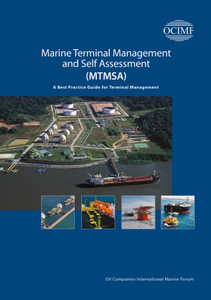
This guide helps owners/operators and Masters produce fair and balanced conditions of use (COU) terms, in order to promote a safety culture in port.
As a pre-condition of being permitted to berth and load and/or discharge at a terminal, Masters are often required to sign a Condition of Use (COU) document. Often these documents are biased against shipowners and contain terms that exonerate the terminal from any liability regarding potential vessel damage.
INTERTANKO have produced these guidelines to raise awareness of the issues around COUs and to help owners/operators and Masters produce fair and balanced contractual terms in order to promote a safety culture in port. The guide begins by outlining contractual issues and liability and insurance cover, before going on to discuss practical considerations and charterparty issues.
Over the years, INTERTANKO Members have drawn the Association’s attention to what the industry refers to as "Conditions of Use" (COU) documents that many oil and gas terminals require the Master to sign, acknowledge receipt of or accept. In almost all instances the Master is required to sign the COU as a precondition of being permitted to berth and load and/or discharge at the terminal.
COUs often contain onerous terms that are biased against owners. These terms frequently include those that:
i. irrespective of fault, not only exonerate the terminal from any liability for any damage caused to the vessel; but also
ii. require owners to compensate the terminal for any damage caused or injury suffered due to the negligence of the terminal.
COUs often contractually seek to deprive owners of their statutory right to limit liability. Generally, and for crude trades in particular, COUs are rarely provided to owners in advance. As a consequence, the Master is often placed in a difficult position – agree the terminal’s asymmetric and unilateral conditions in a time sensitive environment or face the prospect of being denied entry to the port and/or terminal. In addition, if the Master agrees to the COU, owners may be held liable for matters controlled by the terminal. This is an invidious position for owners contractually, in terms of their own risk management and from an insurance perspective. The practice is being followed by an increasing number of terminals around the world. If the Master does not agree to the COU, in most instances, this will also have immediate consequences under any applicable charterparty.
INTERTANKO is concerned about the risk that:
i. owners may prejudice their statutory right to limit their liability through agreement to the terminal COUs and in doing so potentially also prejudice their P&I cover; and
ii. owners may be exposed to unsafe terminal practices for which they may bear unrestricted liability.
In light of the foregoing, one could ask where the incentive is for the terminal to meet stringent safety standards, if the owner is responsible for any incident regardless of fault. COU terms should not expose owners to liabilities beyond those contractually agreed to in any applicable charterparty; or to liabilities which, properly considered, are the responsibility of the terminal, or to risks which cannot be insured in a viable manner
consistent with the well-established international liability regimes.
INTERTANKO has regularly advised its Members of this legal but unbalanced practice of shifting contractual liability, itself a growing concern as terminals are increasingly run with oil major interest. As a result, INTERTANKO has now prepared this Guide to aid owners and Masters faced with the dilemma these various COUs present.
The Guide is designed to:
i. raise awareness of the issues; and
ii. provide owners/operators and Masters with a number of tools designed to produce fair and balanced contractual terms in order to promote a safety culture in port.
The Guide also considers how charterers ordering vessels to terminals which impose onerous COUs may not only share the risk but may also indemnify owners for any uninsured liabilities or losses arising from the COU. The Guide considers both the crude and LNG sectors as there are some notable differences in approach for each sector, in particular on the part of P&I Clubs. The Guide may equally apply to product, bulk and other trades where COUs are used.
Overall, the Guide is designed to inform Members about this difficult issue and assist Members in agreeing fair and balanced COU terms in preference to the onerous terms that are commonly accepted to the detriment of owners and their insurers.
1. Overview
2. Contractual issues
3. Limitation of liability
4. Insurance cover
5. Practical considerations
6. Charterparty issues
Annex
1
–
Examples
of
common
COU
clauses
Annex
2
–
State
Parties
to
LLMC
Convention
1976
and
LLMC
Protocol
1996
INTERTANKO (the International Association of Independent Tanker Owners) is a trade association that has served as the voice for independent tanker owners since 1970, representing the interests of its Members at national, regional and international levels.
The organisation champions an industry dedicated to support global energy networks by delivering safe, efficient and environmentally sound transport services.
INTERTANKO actively works on a wide range of operational, technical, legal and commercial issues affecting tanker owners and operators around the world. It draws on regular and direct contact with its Members and other industry stakeholders to develop and disseminate information and best practice, essential to the tanker industry.
- Number of Pages:
- 32
- Published Date:
- June 2018
- Binding Format:
- Paperback
- Book Height:
- 300 mm
- Book Width:
- 210 mm
- Weight:
- 0.3 kg
- Preview:
- Yes






